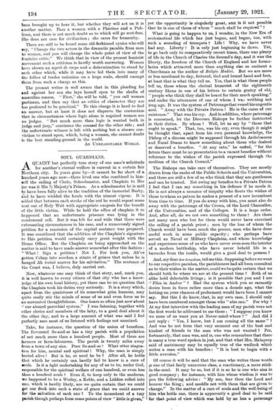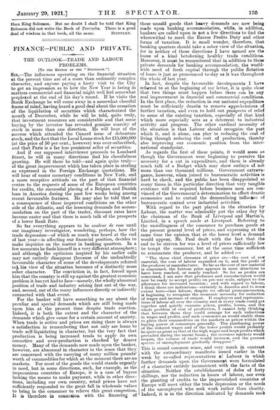SOUL GUARDIANS.
AQUAINT but perfectly true story of one man's solicitude for another's eternal welfare is current in a certain fair Northern city. In years gone by—it cannot be far short of a hundred years ago now—there lived one who combined in him- self the calling of Cleric, Schoolmaster, and Chaplain to Her (or was it His ?) Majesty's Prison. As a schoolmaster he is said to have been fully alive to the tradition of the immortal Busby, and to have wielded the ferule with the utmost vigour. It is added that between each stroke of the rod he would repeat some text out of Holy Writ with appropriate exegesis for the benefit of the little victim. While he held the office of chaplain it so happened that an unfortunate prisoner was lying in the condemned cell. But it was felt far and wide that there were extenuating circumstances in his case, and a numerously signed petition for a remission of the capital sentence was prepared. It was considered that the addition of the Chaplain's signature to this petition would certainly carry great weight with the Home Office. But the Chaplain on being approached on the matter is said to have made answer somewhat after this fashion : " What ! Sign a petition ! Not I. For look you, Ah've gotten t'chap into Beechen a staate of graace that unless he is hanged Ah weant answer for his salviiation." The sentence of the Court was, I believe, duly carried out.
Now, whatever one may think of that story, and, mark you, it is well known to every citizen of that city who has a know- ledge of his own local history, yet there can be no question that the Chaplain took his duties very seriously. It is a story which, apart from the quaintness of its somewhat grim humour, may quite easily stir the minds of some of us and even force us to an unwonted thoughtfulness. One hears so often just now about " our absurd parochial system." I was listening, together with other clerics and members of the laity, to a good deal about it the other day, and to a large amount of what was said I feel perfectly sure most of us listened with feelings not unmixed.
Take, for instance, the question of the union of benefices. The Reverend So-and-so has a tiny parish with a population of not much more than a hundred people. Most of them are farmers or farm-labourers. The parish is twenty miles away from a town of any size. Poor So-and-so ! What utter stagna- tion for him, mental and spiritual ! Why, the man is simply buried alive ! But is he, or need he be ? After all, he holds that which he certainly can hardly fail to know is a cure of souls. Is it a light undertaking for any of us to be, under God, responsible for the spiritual welfare of one hundred, or even less than a hundred souls ? Even if, to keep only to the moderns, we happened to be a Wesley, a Keble, and a Liddon rolled into ono, which is hardly likely, are we quite certain that we could get our flock into such a state of grace that we could answer for the salvation of each one ? To the incumbent of a tiny parish though perhaps from some points of view " little is given,' yet the opportunity is singularly great, and is it not possible that he is one of those of whom " much shall be required" ?
What is going to happen to us, I wonder, in the New Era of ecclesiastical life which has just begun, and begun, too, with such a sounding of trumpets ? Life Why, we have never had any. Liberty ! It is only just beginning to dawn. Yet, to go back only to comparatively recent times, there was plenty of life in the Church of Charles the Second's day, and it was the liberty, the freedom of the Church of England and her formu- laries which attracted more than anything else so eminent a Churchman as the author of Religio Medici. But we are more or less moribund to-day, fettered, tied and bound hand and foot, at least that is what they tell us. Yes, that is what these people tell us, these whom the clerical humorist of the eighteenth century likens in one of his letters to certain gentry of old, " people who think they shall be heard for their much speaking," and under the utterances of one of whom I wac writhing not long ago. It was the system of Patronagethat vexed his ungentle soul. " Away with the Private Patron ! He is the curse of our existence." That was his cry. And in addition, where patronage is concerned, let the Diocesan Bishops be further instructed in their duties. By whom ? Well, let us say by " those that ought to speak." That, too, was his cry, even though it might be thought that, apart from his own personal knowledge, the Bishop of a diocese might be supposed through his Archdeacons and Rural Deans to know something about those who desired or deserved a benefice. " At any rate," he ended, " for the Were there must be no presentation to a vacant benefice without reference to the wishes of the parish expressed through the medium of the Church Council."
The Bishops can take care of themselves. They are mostly drawn from the ranks of the Public Schools and the Universities, and there are still a few of us who think that they are gentlemen and can be trusted. Not owing my benefice to a Private Patron I feel that I can say something in his defence if he needs it. He is not always a monster of iniquity who flouts the wishes of those to whom as patron he makes a present of a new incumbent from time to time. If you do away with him, you must also do away with the patronage of the Crown, of the Lord Chancellor, of the Universities, and of the Colleges. It is a large order. And, after all, do we not owe something to them ? Are there not many men who but for them would, never have exercised the calling of a parish priest ; men by the loss of whom the Church would have been much the poorer, men who have done useful work in some public capacity ; who perhaps have served as Naval or Military Chaplains, and whose knowledge and experience some of us who have never even seen the interior of a modern battleship, who have never beheld life in a barracks from the inside, would give a good deal to possess ?
And, my dear ebov avelheator, tell me this. Supposing before we went to our respective parishes, the parishioners had all been consulted as to their wishes in the matter, could we be quite certain that we should both be where we are at the present time ? Both of us alike hold delectable livings ; is it possible that you and I are Flies in Amber " ? Had the system which you so earnestly desire been in force rather more than a decade ago, what the betting on your chances of preferment would have been I cannot say. But this I do know, that, in my own case, I should only have been numbered amongst those who " also ran." For why ? At my first interview with the leading man of my parish were not the first words he addressed to me these : " I suppose you know we none of us want you at Never-mind-where ? " And did I not reply : " Yes, I know, but I am coming all the same " ? And was he not from that very moment one of the best and kindest of friends to the man who was not wanted ? For, fortunately, that man was, and is, one who remembers that there is many a true word spoken in jest, and that what Mrs. Malaprop said of matrimony may be equally true of the wedlock which unites a man with his benefice : " It is best to begin with a little aversion."
Of course it will be said that the man who writes these words is one of that fairly numerous class, a reactionary, a mere stick- in-the-mud. It may be so, but if it is so he is one who sins in good company ; for instance, with him whose wisdom it was to pen the following advice : " My son, fear thou the Lord and honour the King ; and meddle not with them that are given to change." In the matter of a cure of souls and the well-being of him who holds one, there is apparently a good deal to be said for that point of view which was held by no less a personage
than King Solomon. But no doubt I shall be told that King Solomon did not write the Book of Proverbs. There is a good
deal of wisdom in that book, all the same. SPINTEXT.



































 Previous page
Previous page